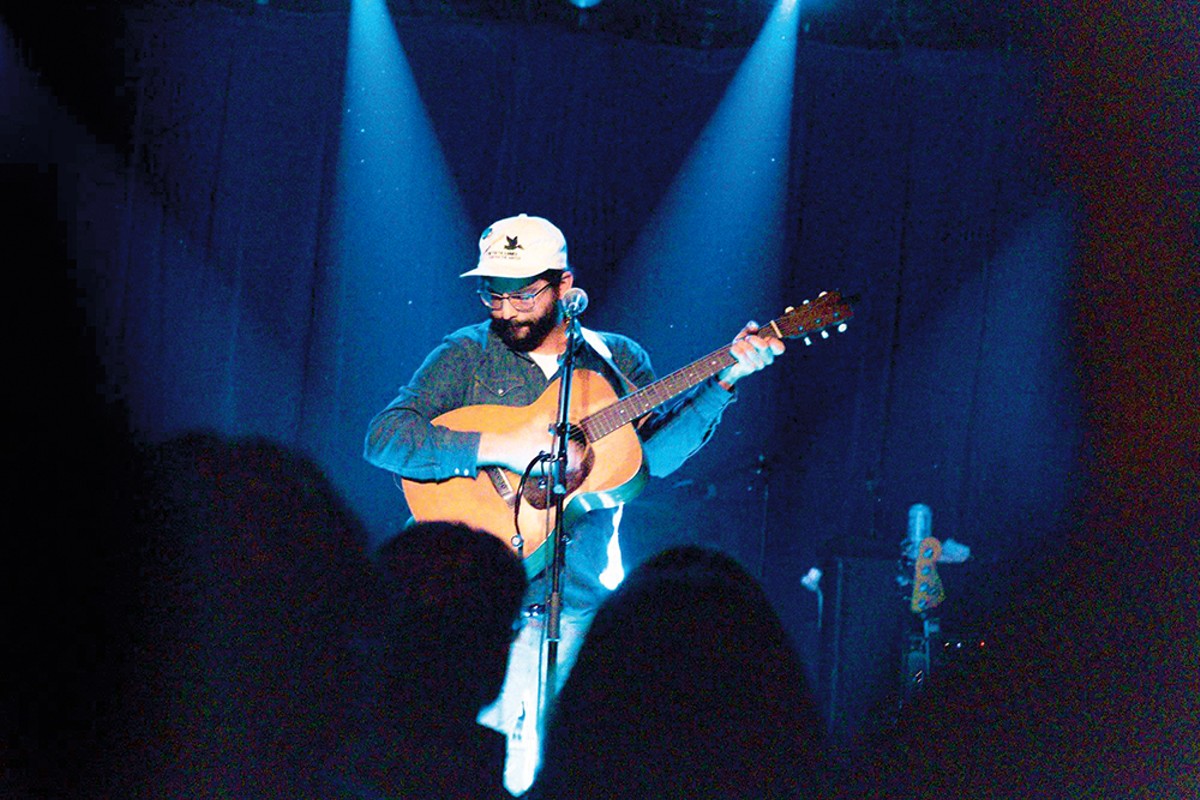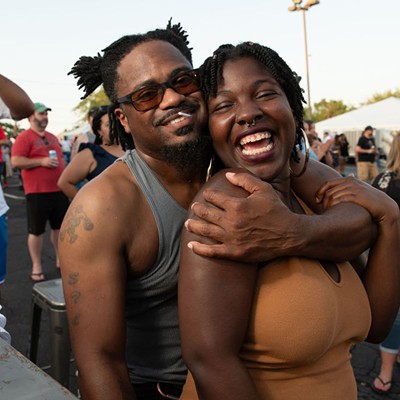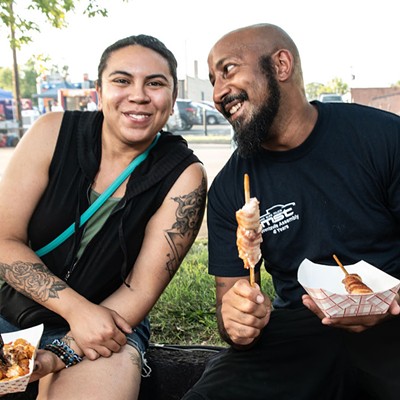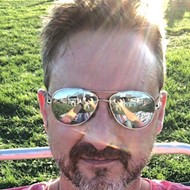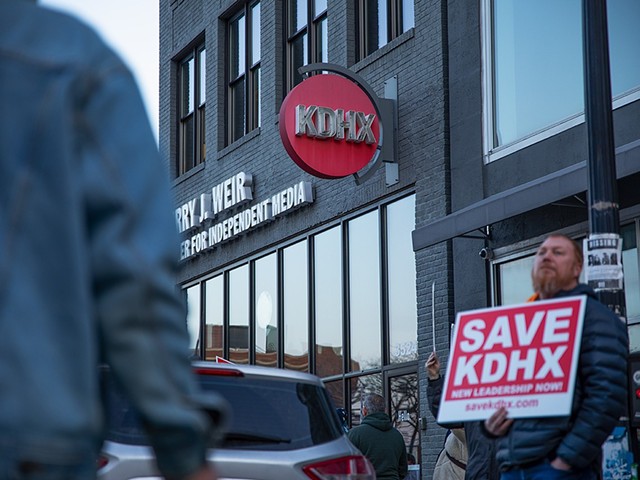When Nick Gusman answers the door of his Tower Grove South bungalow, he's wearing a T-shirt from a writers' week festival for high school students that I booked him for back in 2019. Performing on stage in the high school auditorium, Gusman had been in solo acoustic-and-harmonica folkie mode, playing and singing songs from his then-new debut album, Dear Hard Times. Despite playing for an audience of teenagers who had never willingly listened to folk music much less had ever heard of Nick Gusman, the troubadour nonetheless won the kids over, one of whom later told me that he "didn't think he liked that kind of music" but that he loved the songs and sounds coming out of Gusman that day. It's an effect that Gusman frequently invokes.
Gusman wore the writers' week shirt because he knew I was coming over. He's that kind of guy. He also offers me a bottle of Stella Artois seconds after I walk in. "Let's drink 'em all!" he says, breaking into a new six-pack. (We do.) He's in a celebratory mood: It's the day before his 39th birthday. In a few hours, he's going to play a duo set with fellow country singer-songwriter Nick Lowery at the Hi-Hat, and he's preparing to release two new albums of original material, one with his Americana-rock band Nick Gusman & the Coyotes and another of his own folkier material as a solo artist, plus a songbook. But we'll get to all of that.
Sitting in Gusman's music room, we're about a three-iron away from the house where he grew up near Tower Grove Park. As we talk, he sits on the piano bench in front of a rustic, tan George Stick baby grand, on top of which sits a record player that spins a copy of Bessie Smith's 1920s-era Empty Bed Blues LP, which Gusman bought in Chicago. Acoustic and electric guitars hang along one wall, including his latest, an FG-140 Yamaha that he pulls down and puts in my lap for a test ride at one point. Also in my lap occasionally is Ginsberg, a black and white cat, one of two that live with Gusman and his girlfriend, Tiera.
The other wall is filled with flyers from shows Gusman has played in his various band and solo configurations along with a bookshelf filled with biographies of his songwriting heroes (Dylan, Prine, Waits, Springsteen, Parsons, Guthrie), a tattered copy of On the Road and collections of poetry by T.S. Eliot and Carl Sandburg.
That booklist would likely be unrecognizable to the teenage Gusman when he was attending Oakville High School back in the early aughts in the grips of a different obsession. "I lived for skateboarding," he says. "My friends and I would eat, drink, sleep, breathe skateboarding. We'd skateboard all day, come home and watch skate videos, make our own videos. We were just obsessed with it."
Musically, the skater scene came with bands like 311 and Sublime, and young Nick also soaked in his older siblings' Beastie Boys and Nirvana fandoms. The rootsy music that would define his career as an artist was nowhere on his radar as a teen. Yet somewhere in his DNA, acoustic guitars and harmonicas were making primordial vibrations. "My grandfather played music all around St. Louis and had his own band," Gusman says. "Country music. He liked Hank Williams. I have his guitar."
While Gusman's own parents were not musical, he does remember a formative moment around age 11 when his parents were divorcing and his father turned to country weepers to cope. "My dad would listen to Tim McGraw's 'Don't Take the Girl,'" Gusman recalls. "I'm not really into that kind of country music, but that song slaps. It's such a well-written song. That was actually the first song that made me think of a new level of depth of sensitive songwriting. And I also knew that my dad was listening to that over and over again because of what he was going through. I realized that music is an emotional thing. It's not only a fun thing."
In his senior year, Gusman borrowed a buddy's guitar, learned to play "The House of the Rising Sun," bought an Epiphone electric and almost immediately started writing his own songs. Then a major turning point occurred after high school when Gusman discovered Bob Dylan in, of all places, a Starbucks. Remember when Starbucks sold CDs? Gusman bought the soundtrack to No Direction Home, the 2005 Scorsese-directed Dylan documentary, and he became a changed man.
"I was, like, 'This is the best shit I've ever heard,'" Gusman says. "I'd never heard anything this raw. There were covers on there, too, and I had to find out where it all came from, all this old blues and folk, and I got way into that."
Dylan cracked upon a love of folk and country that connected Gusman back to his own lineage, and the vocal stylings of his grandfather's old favorite, Hank Williams, can still be heard in Gusman's singing today. "[Williams] was a huge influence for me on how to sing," he says. "He does all these voice breaks and goes all over, a little yodel here and there, just the cry stuff that he goes. That's how I learned to sing more emotionally."
In his 20s, Gusman lived in a four-family building on Finkman Street in Princeton Heights, which he recalls was "full of musicians" with whom he cut his teeth as a player, staying up all night picking and hitting local open mics. When he was 23, he moved to Chicago for an 18-month vagabond adventure, exploring the city's musical heritage and writing songs. "I was in study mode," he says. "I was listening to a ton of music, trying to be isolated and see something new. I had various jobs, and I would ride the train and listen to headphones all day, and I wrote a ton of songs." The Windy City was the perfect place to indulge his fascination with old music as he hung out in the city's classic blues clubs. "I was always looking back, trying to find out where the early influences came from," he says. "I went from listening to modern music to trying to explore the oldest blues stuff I could find."
Worried that he needed to find a "real job," Gusman moved back to St. Louis and took a position with AT&T as a technician, working on the poles and installing service in customers' homes, a job he held for more than five years and which "sucked my soul dry," he says. Gusman's passion was for writing and performing music, and at the time he was co-writer and singer for punky alt-country rockers Moon Glampers. "I worked 10 to 12 hours a day, so I would show up for practice in my work uniform and work boots," he remembers. "I was late, and I was so tired, and everything sucked. I got to a point where I was like, 'I like music way too much to be living this way. I'm spending all my time installing people's fucking internet.'"
On the cusp of turning 30, Gusman quit his AT&T job to focus on making music while paying the bills through handyman work. (You may have rested your beers on some of Gusman's handiwork: He built the booths inside the Heavy Anchor and the outdoor bar at Off Broadway.) At this point, Gusman plays me a Moon Glampers-era recording of himself singing a hick-punk cover of Johnny Cash's "Folsom Prison Blues," with Gusman's hillbilly whine atop a bed of distorted guitars.
At the same time, Gusman was writing quieter, folkier material (he plays me one of those songs, too) that wasn't a great fit for Moon Glampers' more raucous approach, so he left the band with designs on making his first album (taking a few Glampers along with him). While forming his own band, he met fiddler and '70s-throwback party animal Sean Kamery at an open mic night in which the two spontaneously became musical brothers. "We played for an hour that night and just clicked hard," he remembers. "I immediately said. 'You should be in my band.'"
His Dear Hard Times, released in 2018, was recorded at Native Sound Recordings with 21 different musicians. "I was inviting musicians who were way more established than me to help me on these songs," he says. "Nothing was rehearsed. Everyone would just hear the demos and work them out in the studio. I was paying shitloads of money, but I was loving it." And was making his own album as fulfilling as he'd dreamt back when he was toiling away at a day job? "Way more fulfilling," he says. "I remember the first day after being in the studio, I was listening to the recordings and crying while I was driving around. I was like, 'Holy shit. This is what I've been missing out on?'"
Dear Hard Times established Gusman as a talented tunesmith of beyond-his-years narrative depth, timelessly appealing melodies, unshitty lyrics and a graceful vocal delivery. Next, working with a growing tribe of pickers, he made a self-titled band album billed as Nick Gusman & the Coyotes, an excellent twang-rock record filled with Gusman's river ditties, honky-tonk moaners, heartbreak ballads, roots-rock janglers, cowboy tunes and fingerpicked folk songs. That album led to extensive touring for Gusman and his band, including two trips to Europe in 2022 and 2023, with shows in Germany, Switzerland, Belgium and the Netherlands.
The successes of his first two albums only made Gusman want more, and he has been on a songwriting tear in the last couple of years. "I've been writing more and more on the piano," he tells me as he plays a progression of rolling, walking chords. He shows me drafts of a song he recently finished — a handwritten version, heavily edited with words scratched out and replaced, and a typed-out second version. "The handwritten one is straight from my brain to that," he says. "There might be more revisions later, but they'll come as I play them out and decide I might have another rhyme or a better word to plug in."
In other words, Gusman is always working, always moving forward, always looking toward the next thing. Or, as is the case in 2024, several things. His recent explosion of creativity has resulted in two new albums, both of which have been fully recorded and are planned for releases later this year. The full-band album with the Coyotes (Kamery on fiddle, Garrett Rongey on lead guitar, Tony Hall on keys, Justin Haltmar on bass and Jeremy Reidy on drums) is Lifting Heavy Things, a rowdier, more rocking affair than the last Coyotes record.
Gusman plays me some unmastered tracks from the album, which sound like he's carrying the torch for St. Louis' rich alt-country history. The new songs sound like Whiskeytown or early Wilco if Paul Westerberg were writing and singing, except louder and shit-kickier. The music takes the listener on a wide-ranging tour: "Sound of a Broken Heart" has Gusman belting out a big classic rock melody; "Stray Dog" is a bloozy, fiddle-abetted slow-burner; "Shortcut the Mountain" flexes the band's jammy side; "Trucker" is a honky-tonk party-starter written and sung by Rongey as Gusman goes crazy on the harp; "Tokyo Hotel" is a gorgeous ballad with backup vocals by local twang siren Mattie Schell; closing track "We Got a Job to Do" is Gusman's manifesto, the mission statement of a rock & roll lifer.
The other album in the can might as well be titled Another Side of Nick Gusman, as it comprises songs that represent his folkier, quieter compositions, recorded in drumless arrangements with local producer Sam Golden, whom Gusman calls "maybe the best musician in St. Louis." He plays a track from the solo album called "The King of Mistakes," a beautiful broken-hearted country ballad that features a swirling organ solo played by Golden.
Gusman listens intently as the song plays, looking up only to comment on the organ solo: "Isn't that sick?" he says with a broad smile.
But two new albums can't come close to containing all the songs Gusman wants to get out there. He wants to release a songbook that contains the lyrics and chords to 100 of his songs, followed by audio recordings of those songs in 10-song batches. Many of the compositions are songs that Gusman might have played out a time or two but gave up on after the initial reaction.
"I'm so self-conscious about things," he says. "I don't mean that in a debilitating way, but sometimes as an artist, you play a song one time and the people don't react, and you think, 'Oh, that sucked,' and you just put it away. But I shouldn't. I think I should put them out in that raw form, all the songs, and that will give people a chance to come back to them and find one that they attach themselves to. It's just worth getting them out there."
So a 100-song book of compositions and 10 upcoming albums of those original songs? It's a wildly ambitious project, but one that Gusman is determined to see through. And with Nick Gusman's talent, his restless heart and his track record for pursuing his passions, there's no reason to doubt he can do it.
Subscribe to Riverfront Times newsletters.Follow us: Apple News | Google News | NewsBreak | Reddit | Instagram | Facebook | Twitter | Or sign up for our RSS Feed

